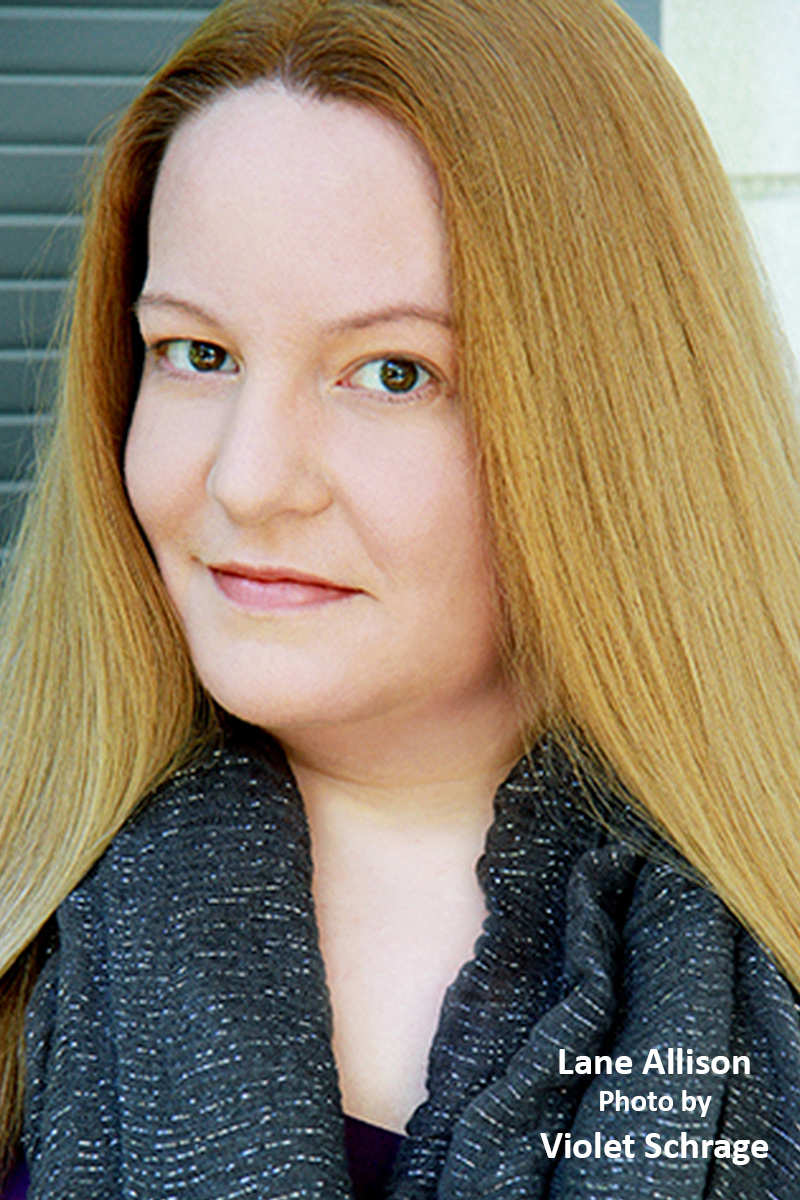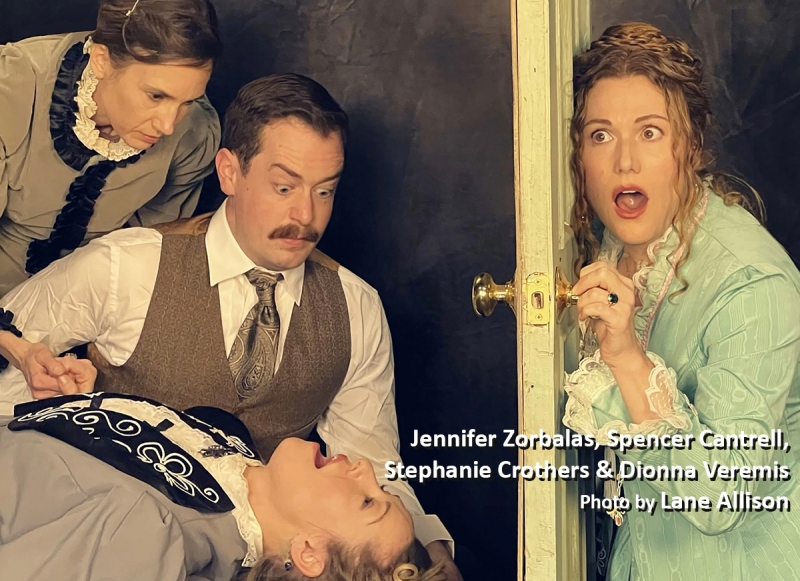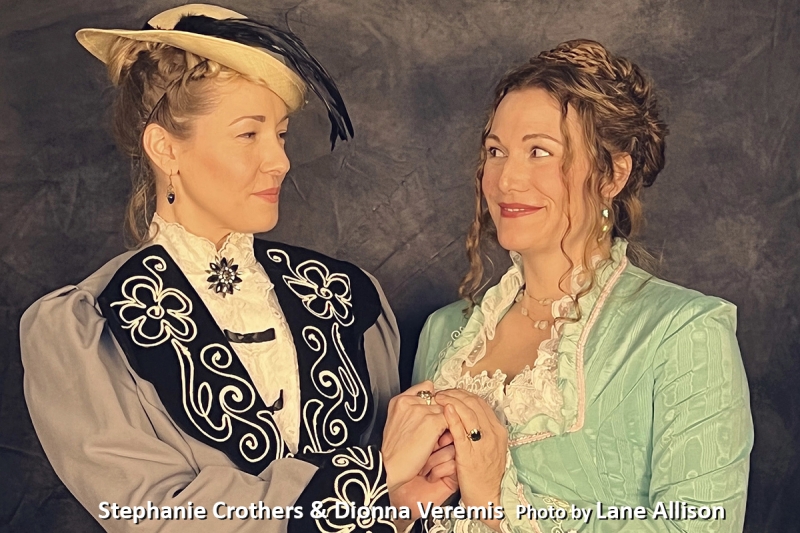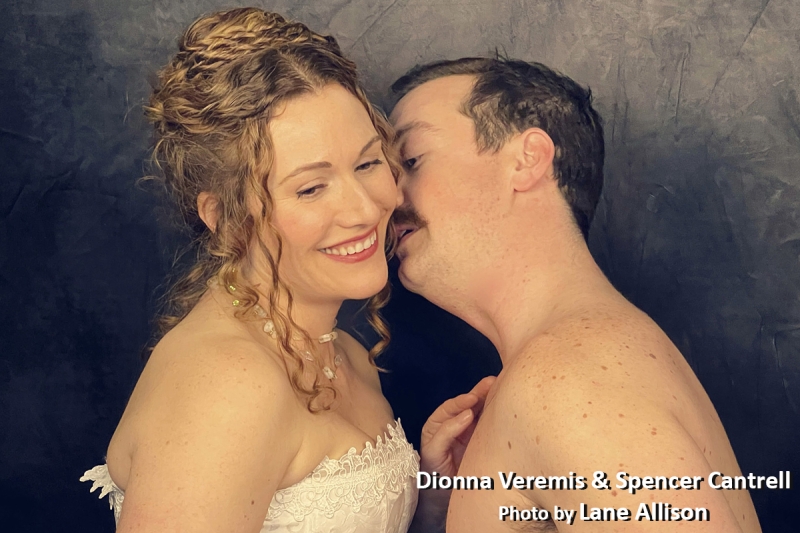Interview: Director Lane Allison Cathartically Inspired By Sarah Ruhl's IN THE NEXT ROOM, OR THE VIBRATOR PLAY
Open Fist Theatre Company returns to live performances with Sarah Ruhl’s In the Next Room, or the vibrator play opening March 18th at Atwater Village Theatre

Open Fist Theatre Company returns to live performances with Sarah Ruhl's In the Next Room, or the vibrator play opening March 18th at Atwater Village Theatre. Lane Allison directs the cast of Bryan Robert Bertone, Spencer Cantrell, Stephanie Crothers, Monazia Smith, Dionna Veremis, Alex Wells and Jennifer Zorbalas. I had the opportunity to toss out a few queries to Lane on her vibrator play, her back story with Open Fist and her history with L.A. Theatre.
Thank you for taking the time for this interview, Lane!
What factors led Open Fist to choose Sarah Ruhl's In the Next Room, or the vibrator play as their first in-person production? Someone had seen a production of this somewhere else since its Berkeley Rep and Broadway debut in 2009?
I had been floating the idea of "Next Room..." for a while, as it's a piece I have loved since I read it in 2009, and I had done an internal reading of it this last summer for the company to have it be better considered for a possible future production. It got a very warm reception, sparked a lot of discussion and our company and board found it to be a moving and poignant piece, along with it being something really fun and challenging to sink our teeth into.
It's been a wild ride, but so worth it. Sarah Ruhl will never fully understand how much her play not only inspired us, but was also extremely cathartic to each of us as artists, who had been like a pod of beached whales just waiting for the tide to come pull us back in. We are so grateful.
As a member of Open Fist, did you get first dibs to direct this?
Happily, yes! When I pitched the play, I pitched it with myself attached as director and discussed what my vision was for the piece. I am so thankful that the play was chosen with myself alongside it.
A very provocative title, what would your three-line pitch of In the Next Room, or the vibrator play be?
Sarah Ruhl. Sarah Ruhl. Sarah Ruhl.
-or-
The advent of electricity unintentionally, but most assuredly, sparks the women's movement and with it, a couple soon discover that the best is yet to come...
Set in the 1880s, the play's lead protagonists are Dr. & Mrs. Givings. How would you compare and contrast their attitudes to the use of a vibrator in treating hysterical women?
Well, the whole set up and dynamic is that Dr. Givings has the knowledge and Mrs. Givings does not. As he treats these "hysterical" women (and men), she can only catch a glimpse of them as they pass through her living room into "the next room" and can only listen at the door for clues as to what her husband's profession entails. Her curiosity and frustration give rise to a confidence that allows her the gumption needed to explore further by striking up conversations with his patients and investigating things for herself. Meanwhile, Dr. Givings believes that his vast knowledge and expertise has reached a pinnacle that allows for a better understanding over a situation that he is, in fact, quite naive about - what makes a woman tick - and this sets up a beautiful backdrop for these characters to fumble over and against one another, even though they are ironically striving for the same thing: to be seen, acknowledged, and respected.
Would you advise those who aren't comfortable with talk centering around a vibrator not to attend?
 Actually, quite the opposite. I would encourage them to attend! Great art, like this script, is intended to be seen and discussed by a wide range of audiences. Forgive the cliché, but we are here to hold the mirror up to nature, and nature has been recently shaken to its core. So what better time could there be than this new renaissance to shed one's confines - physically, mentally, and emotionally - and lean into what makes you uncomfortable and, thereby, gain a new ownership over it - either by confirming your previously held belief and finding comfort in your consistency, or discovering a new attitude and perspective that may open even more doorways for personal growth. Art does all that just by existing. Either way, you win - how many other things in life can offer that? So, yes, come one and all (pun intended).
Actually, quite the opposite. I would encourage them to attend! Great art, like this script, is intended to be seen and discussed by a wide range of audiences. Forgive the cliché, but we are here to hold the mirror up to nature, and nature has been recently shaken to its core. So what better time could there be than this new renaissance to shed one's confines - physically, mentally, and emotionally - and lean into what makes you uncomfortable and, thereby, gain a new ownership over it - either by confirming your previously held belief and finding comfort in your consistency, or discovering a new attitude and perspective that may open even more doorways for personal growth. Art does all that just by existing. Either way, you win - how many other things in life can offer that? So, yes, come one and all (pun intended).
Any graphic scenes necessitate an intimacy coordinator?
I say this with the greatest respect to intimacy coordinators, as I feel they are a vital addition to our industry, particularly in the world of television and film where rehearsals are a luxury and usually in very short supply. Directors have always, until recently, been their own intimacy coordinators. Intimacy, whether physical, mental, or emotional, is at the heart of how, what, and why we do what we do. Unfortunately, there are some bad individuals, mostly male identifying, who have taken advantage of what should be a free and safe environment to share experiences and exchange ideas in the name of art that have done nothing but exploit it for their own twisted endeavors, thus creating and permeating a fear-based environment that now needs re-examining and new precautions put in place. It's interesting doing a theatre production like this in Los Angeles, the proverbial birthplace of lechery in the industry.
We are a membership company that strives to cast from within the company and most of us have previously worked with each other, successfully, in regard to personal boundaries not being crossed. We had extensive conversations with those company actors, as well as with each new performer as they signed on to audition, during the auditions and throughout the rehearsal process regarding consent and expectations of professionalism. We came to a consensus that the cast - both as individuals and as a full and democratic ensemble - felt confident in my abilities as a director and in Open Fist as a company (particularly with our producer, Martha Demson, who is also our Artistic Director) to continue to strive for a "safety first" sensibility in all capacities, and especially where physical intimacy was concerned. It probably didn't hurt that we are currently a female-led company and that I am a female identifying director. If a male-led team were producing this play and I was auditioning, I would prefer an intimacy coordinator. You can call that a double standard, but when I'm walking home at night alone, I never cross the street to get away from female-identifying individuals. It is predominantly male-identifying individuals who have sown a history to be feared.
That said, if ever a moment were to arise where an intimacy coordinator is preferred on a production I am directing now or in the future, I wouldn't hesitate to acquiesce, nor would I take it personally. The motivation for one's preferences in these types of situations is never to be questioned, only respected and adhered to.
Did you initiate any introductory exercises to get your cast comfortable enough to directly address any sigma or reservations regarding the use of a vibrator?
As a full cast, we did the usual due diligence by way of dramaturgical discussion and "table work." Being forced to work solely over Zoom for so long was actually a fortuitous turn because we could use more time to flesh out our thoughts, feelings, and expectations than if we had been on a more typical production timeline. Once we were able to be in person for rehearsals, I also dedicated a rehearsal to what I lovingly called the "paroxysm workshop" for the cast members who simulate org*sms onstage, to give them a safe arena to explore their voice and movement work, as well as find comradery with each other and, hopefully, feel safer working in such a capacity with me as their director and intimacy coordinator. We have also maintained an open door and full transparency policy for all involved.
 You've been acting and directing in Los Angeles theatre since you moved to Los Angeles over ten years ago. What changes have you seen with the Los Angeles theatre community over the years?
You've been acting and directing in Los Angeles theatre since you moved to Los Angeles over ten years ago. What changes have you seen with the Los Angeles theatre community over the years?
I suppose the main thing I have seen and have been honored to be a part of is diversity awareness, in all its varied dynamics and representations coming to the forefront as the new standard to be aimed for and hopefully achieved. I am a female-identifying artist who has struggled, as all female-identifying individuals do in this patriarchal and narrow-minded world, to find her voice and hone it for battle. There are many other individuals struggling with their own voices to be heard in regard to race, gender, and physical and mental capability, as well as on economic and educational fronts, who I hope can have the awakening, awareness, and respect finally owed them now that the female movement is finally gaining real forward momentum. I think we are better when we celebrate and recognize the whole of nature, and it certainly makes for better entertainment.
You were previously a member of The Production Company. What about Open Fist attracted you to join OFTC?
I really liked that it was female led; it wasn't a requirement, but it was definitely an added bonus for me personally. I also liked how the company operated professionally but had a familial sensibility. The company also, more often than not, comes from a place of "yes" and fosters both a sense of community as well as a place for personal growth.
Do you see your theatre work as an effective learning foundation for your film and TV gigs?
Definitely. I love TV and film but feel that theatre as a foundation allows for a more full immersion of the artist, especially where training is concerned, that, in turn, translates into a very strong foundation for an actor's "toolbox". Not that TV and film training doesn't provide its own important tools, but there is something sacred to a theatre space and the safety it cradles you in, particularly as a young actor, that is unique unto itself and is invaluable to carry with you across all mediums.
What lesson/s did you learn from doing theatre in Los Angeles that you definitely use in your film and TV work?
I think doing theatre in L.A., amidst the backdrop of Hollywood, keeps you humble - and that, for some reason, can often be in short supply when a camera gets added to the mix. Not that the theatre world is devoid of ego, but there is a measurable difference that is palpable.
Would you advise an acting newbie to Hollywood to do theatre?
100%, for all the reasons I have stated thus far and because it will make you a better actor. Just as an athlete who's known for one sport trains in other sports to improve their preferred one, the more methodology you can learn and have ready to apply, the more confident you will be when opportunity comes knocking. And confidence is a key ingredient for success in this industry.
What did you originally want to be growing up - actor or director?
I learned what an actor was when I was three and my father cast me in a Sooner Federal Bank commercial his advertising company was handling. I have a very clear memory of the entire day. Looking into the camera lens, I was transfixed and somehow understood that what it was about to capture would translate into a story that would somehow affect others (even if only to move them to gain financial insurance) and I was hooked. Then, shortly thereafter, I saw Drew Barrymore in ET and put it together that she was doing what I had done in the commercial, but for a whole long story and I knew that was what I wanted to do too. Directing as an additive to acting soon followed, but it wasn't until I was in high school and had an extraordinary acting teacher, Scott Shallenbarger, who also fostered my love for directing - along with my being at a school, Highland Park High School on the North Shore of Chicago, that prized the arts as much as they do sports, if not more so - that I started to gain the confidence to use my voice as a director. It's a rare gift that I hold dear to this day and held onto as a bouy against the rougher seas in the years that followed.
 What gives you more gratification - soaking up your standing ovation on stage during our curtain call? Or watching your cast receive their props while sitting in the back of the house?
What gives you more gratification - soaking up your standing ovation on stage during our curtain call? Or watching your cast receive their props while sitting in the back of the house?
First, thank you for assuming I even get standing ovations, LOL! Definitely the latter. Nothing compares to watching the ensemble you auditioned, cultivated the best combinations of to create the cast, and then worked with to bring forth a story you're passionate about, see it come to fruition, and then get to watch an audience have a positive visceral reaction to it. I cannot wait for L.A. audiences to watch this brave, beautiful, and dynamic cast (supported by an amazing design team and crew) perform the crap out of this show!
What's in the near future for Lane Allison? More directing? More acting?
I have been very lucky to keep busy during the pandemic and would love to catch my breath a bit and get in some long awaited travel. But I also know myself and when an opportunity that excites me knocks, I always answer the door. Life is too short not to do what you love.
Thank you again, Lane! I look forward to checking out your vibrator play.
Thank you, Gil! Really great questions! I had fun answering them and appreciate your thoughtfulness.
For tickets to the live performances of In the Next Room, Or the Vibrator Play through April 23, 2022; log onto www.openfist.org
Comments

Videos
